by cidaut | Dec 14, 2020 | Energy, MOBILITY
On Tuesday, October 20, 2020, “miciudadatodogas initiative”, together with the León City Council, organized the conference “Renewable Gas, Mobility and Sustainable Development”. This conference was followed in online format by more than 70 attendees related to natural and renewable gas.

On behalf of CIDAUT, researcher José Ignacio Domínguez took part in the 2nd Roundtable “Renewable Gases and the promotion of the development of a just transition strategy” where he commented on the opportunities in mobility with renewable hydrogen in Castilla y León. During the event, low-carbon economy projects and initiatives were announced that, in addition to contributing to the decarbonization process, also collaborate in the deployment of the Spanish just transition strategy.
This event also allow the attendees to learn about the new sustainable mobility strategy that the Ministry of Transport, Mobility and Urban Agenda is promoting at national level, as well as the policies that are being developed in this matter by Junta de Castilla y León and the City Council of León.
miciudadatodogas is a public-private initiative, involving companies related to natural and renewable gas and sustainable cities committed to the circular economy and the fight against climate change.
by cidaut | Oct 21, 2020 | Sin categoría
The COVID-19 has forced to celebrate the II Foro Iberoamericano de la Energía on-line. In this edition, Cidaut has been invited to show its know-how and experience in the development of solutions for sustainable mobility. The presentation made by the Research and Development Center has been focused on the methodology followed in the last twelve years to complete the whole path from the idea to the manufacturing of a safe urban electric vehicle.
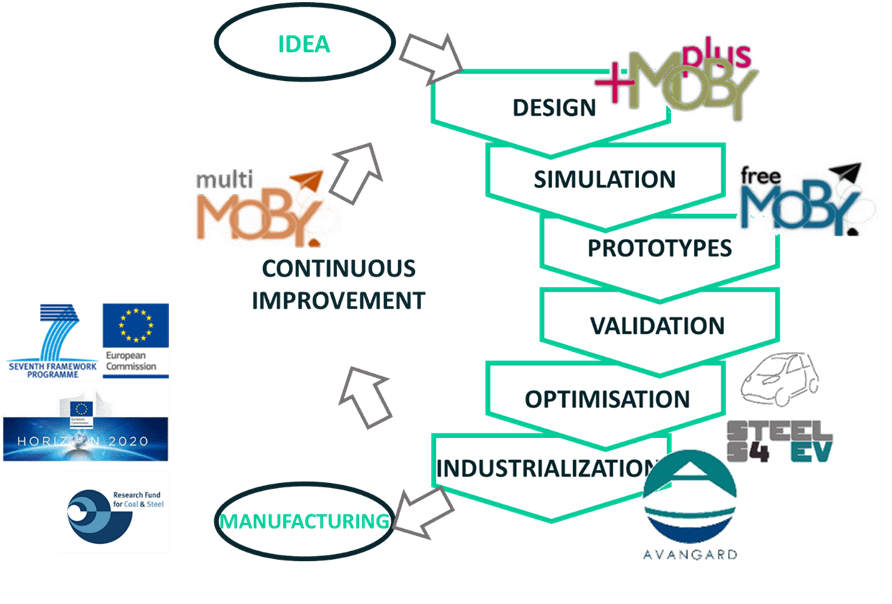 The first point of the presentation was to highlight the support of the European Commission through the different funding programs and the great contribution of the different and numerous partners involved in the different project presented. Although Cidaut has worked in different solutions for the vehicle structures, mainly CFRP, light alloys and AHSS, in this case the solution based on Advanced High Strength Steel was presented. This working line started on 2012 with the design of a safe urban vehicle (PLUS-MOBY Project) and its related infrastructure. The vehicle’s power train consisted in two motor one per axle with and enhanced dynamic behavior and improvement crashworthiness for lateral and frontal crashes. Both the vehicle and the infrastructure used the photovoltaic energy to reduce de carbon footprint with cells in the roof of the vehicle and in the infrastructure, also the batteries available in the infrastructure were compatible with the batteries in the car to allow battery swapping.
The first point of the presentation was to highlight the support of the European Commission through the different funding programs and the great contribution of the different and numerous partners involved in the different project presented. Although Cidaut has worked in different solutions for the vehicle structures, mainly CFRP, light alloys and AHSS, in this case the solution based on Advanced High Strength Steel was presented. This working line started on 2012 with the design of a safe urban vehicle (PLUS-MOBY Project) and its related infrastructure. The vehicle’s power train consisted in two motor one per axle with and enhanced dynamic behavior and improvement crashworthiness for lateral and frontal crashes. Both the vehicle and the infrastructure used the photovoltaic energy to reduce de carbon footprint with cells in the roof of the vehicle and in the infrastructure, also the batteries available in the infrastructure were compatible with the batteries in the car to allow battery swapping.
Along Steel S4 EV Project, the vehicle structure is optimize paying special attention to the cutting and welding processes of the structure and the assembly of the vehicle as a whole. The aim is to make a clean safe vehicle easy and cheap to be manufactured. The design of the micro-factory where the solution achieved in Steel S4 EV can be produced is been tackled in Avangard Project, where the main objective is the definition of a 4.000m2 plant where different configurations of the vehicle (van, pick-up, enlarged van, standard,…) can de produced with an investment 90% lower in comparison to a standard vehicle factory.
Finally, the product will be improved thanks to the integration of automated driving capabilities that will be implement in the coming project MULTI-MOBY.
by cidaut | Oct 21, 2020 | Sin categoría
SAFE STRIP Project is reaching its final stage. After the users’ trials, successfully completed during the first half of 2020 in Trento (Italy), Thessaloniki (Greece), Athens (Greece) and Valladolid (Spain), different events have been hold in the three countries to share the results of the project with relevant stakeholders from the administration and the industry. The structure of the meetings have been quite similar with a presentation from the local partner to introduce the project and to show the most relevant results followed by a discussion with the invited stakeholders to better understand the time to market for the solutions and applications developed along the project.
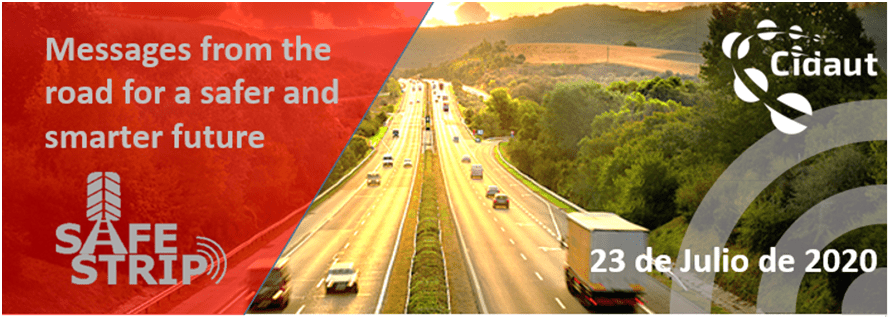
In chronological order, the first of the events took place in Athens on July 20th. it was hosted by the technical leader of the project, Certh. with representatives from the Greek Government and the European Commission. The meeting included a demonstration of some of the solutions developed along the project to show the assistants the important advantages in safety, traffic flow and infrastructure costs achieved thanks to the development of SAFE STRIP Project.
The second event was hold in Italy, organized by Centro Riserche Fiat and A22 Autostrada Brennero on July 22nd. In this meeting, the presence of infrastructure operators was especially relevant. It was highlighted that SAFE STRIP solutions could cover the need of a suitable communication channel to reach the drivers and riders, improving the current applications with a significant lower cost.
The third event was hold at Cidaut facilities in Boecillo on July 23rd. Due to COVID-19 travelling restrictions, it was a hybrid on-line and face-to-face meeting. The Leader of the Urban Mobility Center and the Coordinator of the Innovation Area and Economic Development were the representatives from the local administration, the Research and Development Responsible of AMAC Europe was the representative of the infrastructure operators and a development engineer from Road Steel Engineering was representing the infrastructure developers. The rest of the assistants was personnel from Cidaut who was involved in the project to explain the project results. The participants were invited to answer several questions in order to understand the acceptability of the solutions and applications with a successful response from the different stakeholders.
by cidaut | Oct 21, 2020 | Sin categoría
Despite all limitations derived from the lockdowns and restrictions imposed after the outbreak of Covid-19 in Europe, ReFreeDrive Consortium has managed to deal with the situation and go ahead with the project activities in these last months. A six months extension has been agreed with the CE to compensate the unexpected delays, therefore the project will now end in March 2021.
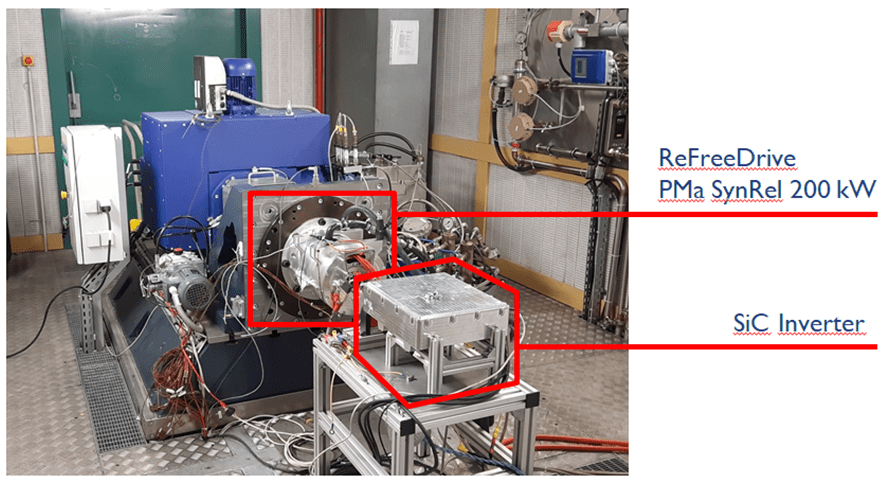
After the comeback to the industrial activity was allowed, the manufacturing and testing of the prototypes was resumed. At this point, both permanent magnets assisted and pure synchronous reluctance motors for 75kW and 200kW applications have been delivered and tested at IFPEN facilities. Induction motors are expected to be fully assembled in the following weeks. Powertrain integration activities are now beginning at CIDAUT, and preliminary in-vehicle integration tasks (such as installing cooling circuits and the battery pack) have already started at PRIVÉ.
Several dissemination activities have been organized in the last months to maintain audience engagement. Especially relevant have been the two ReFreeDrive webinars aiming to share the project scope, objectives and achievements with technical and non-technical audiences. Up to now, the topics covered in the webinars have been “Rare earth-free motor designs for e-mobility” and “Control strategies and electric drive design of induction and synchronous reluctance motors for e-mobility”. Moreover, ReFreeDrive participated with all other GV04 H2020 EU-projects (DRIVEMODE, MODULED) in a webinar titled “Next generation electric drivetrains for fully electric vehicles, focusing on high efficiency and low cost”, in the context of the European Mobility Week, which took place from 16th to 22th September 2020.
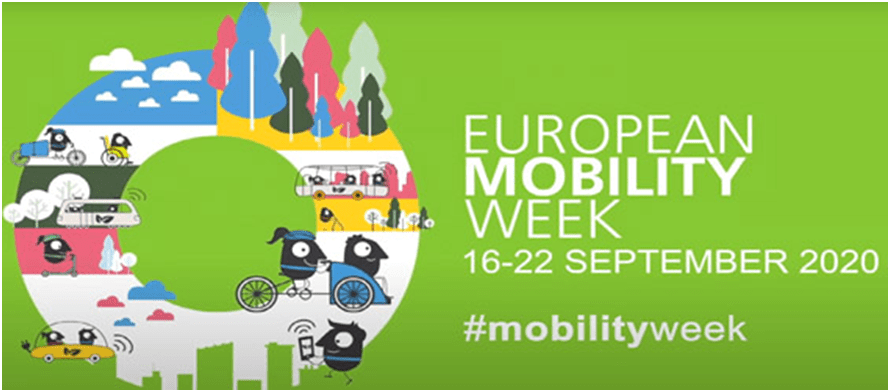
Last, but not least, on 1st October the 36-months General Assembly meeting was celebrated as an online meeting. There, the project progress was evaluated and all the ongoing activities monitored, and the activities for the last months of the project were scheduled to ensure that all tasks end successfully in time.
by cidaut | Oct 21, 2020 | Sin categoría
The World Hydrogen Congress took place online from 22-24 September and CIDAUT could attend it thanks to the collaboration of AeH2. The World Hydrogen Congress is the annual meeting place for senior decision-makers right across the hydrogen production and distribution value chain. An outstanding executive line up augmented by strong association support from both the blue and green hydrogen markets is leading to what promises to be a unique event for all hydrogen executives.
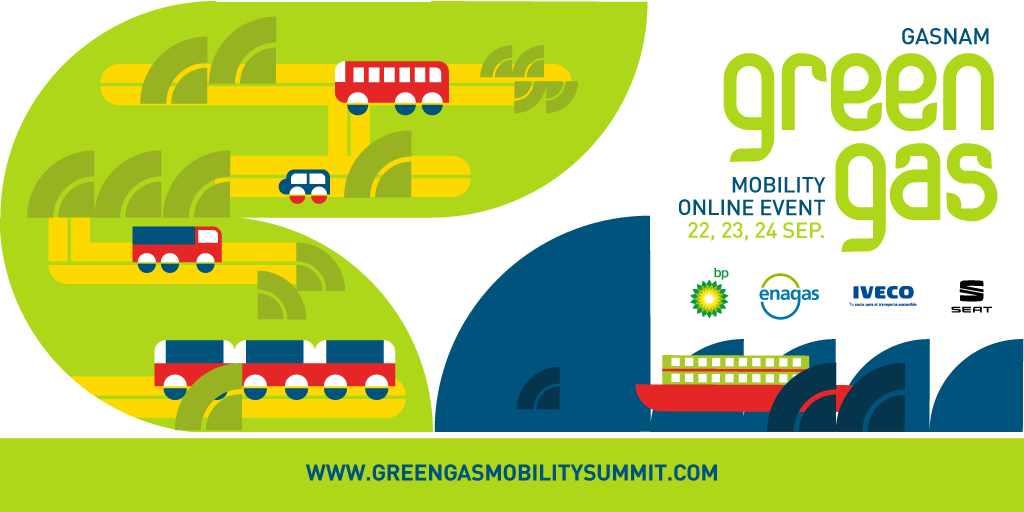
The congress lasted for three days with presentations and debates from the main stakeholders in the hydrogen sector through an innovative platform of thought-leaders, exchanges and debates between key hydrogen stakeholders, technology & science providers and world-leading industry views.
Continuing with hydrogen-related events, CIDAUT, as a member of GASNAM (an association that promotes the use of natural gas, hydrogen and renewable gas in mobility, both land and sea, in the Iberian Peninsula), attended the annual meeting on gas mobility that this association organizes.
This year, under a 100% virtual format, the Green Gas Mobility Online Event has had more than 50 conferences, B2B meetings, and a large virtual exhibition. For three days, from October 22 to 24, the benefits that the use of carbon neutral gases such as biomethane, synthetic gas or hydrogen brings to mobility have been analyzed.





